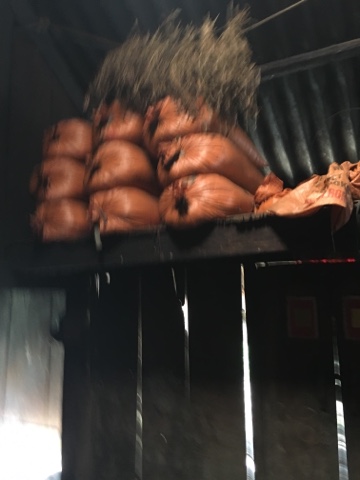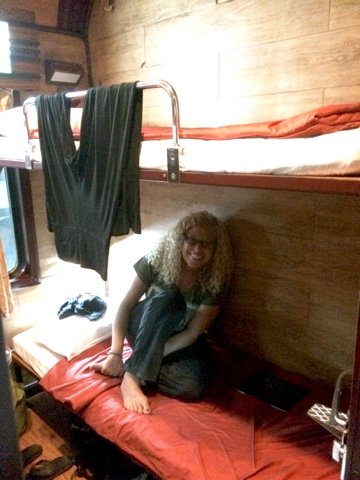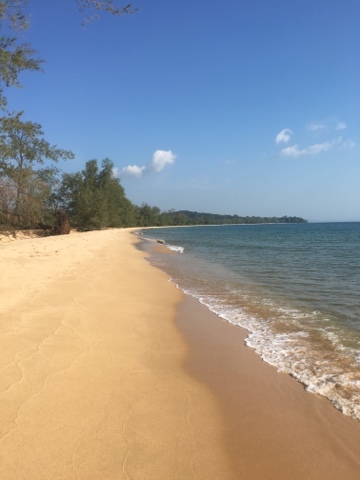I just finished pulling off the ends of the beans for our dinner with our homestay host and guide, Mau. We sit almost squatting on cement floor on the low, blue stools with her nephew while he cuts carrots and her niece adds wood to the “kitchen stove” which is little more than a rebar frame to support the the tea kettle and wok.
I am grateful to be out of the big city.
I want to walk through muddy lanes in the middle of rice fields and wave at children standing in front of their homes. I want to step aside for the stray pig, and hop across a muddy river crossing.
I want the peace and quiet of an occasional motor scooter as I step aside and watch in amazement that people can actually make it up these hills on these types of steep, half paved roads.
I want to say “excuse me sir!” As I sneak past the water buffalo obstructing my path.
I want to listen to 35 kindergartners running and screaming around their one room school house, as their teacher steps into the kitchen to cook them their vegetables and rice for snack.
I want to sit at wooden table on a quiet street, and watch the village boys play marbles, as an eight year old girl makes repeated circles on a bicycle in her cement yard.
Everyone knows one another. Here no one greets with hello; they ask you where you are going or what you are doing. Babies sleep in slings on their mothers’ backs and clothes dry on bamboo fences. Brightly colored batik print bags are slung over every woman’s body, their clothes dyed a purplish- black from the indigo plant.
Burlap bags of rice are stored in every house, be they one or three rooms. “We eat rice with every meal,” Mau reminds us. I have not forgotten.
“Here in Hmong language, we say O’Chau for thank you,” Mau tells us, as we sit by the river taking an afternoon break in our hike. She breaks out a cheat sheet with some words she is supposed to teach us, and we practice asking each other’s names and how we are feeling. She then says it is time for her to learn, and I wonder what we can possibly teach her as her English seems very fluid. She holds up her paper from Sapa O’Chau, an agency that believes in social responsibility in their tourism and asks how to pronounce the words on the list. I look at the sheet. Her words read, “pessimistic, reckless, selfish, haughty and gruff” and I think those are likely all new words for her. She equates selfish to selfie, and I laugh as I explain to her that indeed they are related. “You are so selfish!” she quips her hands on her narrow waist and I tell her she is on the right track.

We sit around the table, Mau, her son, two daughters, niece, nephew, Ain from Brunei, David and I ready to eat after hours of cooking over the make shift stove. Underneath the table, a bowl of embers burn to keep us warm.
The table is full of freshly made spring rolls, fried tofu with tomatoes, saluted morning glory with garlic, green beans, broccoli, chicken and pork.
Each of us have a small bowl of rice and we eat family style, the best meal I have had in south east Asia to date. I am full,but I can't stop eating. After the meal, Mau insists we drink some happy water to keep us warm that night and I sip the rice wine as the others shoot theirs back quickly, the clear liquid burning as it slides down my throat.
The sun is sinking low in the sky, and there is a definite chill in the air that we have not felt further south. We hope tomorrow will be another bright, sunny day, but know that even if it rains, we will walk slowly in the silence of the nature and village life.
We wake up in the morning to a distinctly different climate, the mist so low it wets our face in the early morning light. “Maybe it will be sunny later,” Mau says when she sees our disappointed faces.
“Maybe?” I offer, trying to remind myself that we had already had a beautiful day the day before and that we could still hike with the mist and it would be fine.
David’s stomach now finally better, he has woken up with what seems like a cold, and between his cold and my morning allergy, I get the distinct impression that Mau cannot wait for us to get out of the house. We eat the left overs from the night before for breakfast along with coffee, fruit and some crepe like pancakes that I know she has made for our benefit.
I am so full when we set out that I am not sure I’ll be able to walk, but after a few moments, I manage to forget my food baby and head up the hill after David. Mau continues to talk and text on the phone every few minutes and I wonder how many friends and family she must have, with the quantity of time she spent on the cell phone. The smart phone culture has certainly not skipped the ethnic minority villages of North Vietnam.
We haven’t been hiking long before I realize that a lengthy hike is not in our cards. David’s beard is dripping with the moisture in the air, both Mau and my hair are soaked as well and David has already donned every article of clothing he has with him and is still complaining that he has a chill.
I tell Mau that finishing around 2 will be fine as we hit the summit to see the non existent view of the rice terraces, river and valley below. “It’s very beautiful here when it’s sunny!” Mau squeaks as we tell yet another local following us, “no thank you” before she gets her hopes up that we are interested in the wares she carries on the basket on her back. We head into the bamboo forest and Mau explains the many uses of bamboo, as we skate along the path of mud and rocks.
We should have known now that we are off the paved areas that it is going to be slippery. Maybe we did know since we had watched that guy slip the day before at the beginning of our hike. But that was before it happened to us. I know what you’re thinking. You imagining me sliding down the mountain on my butt, uselessly pawing at the rocks and shrubbery as they go by. I know you know what a klutz I am.
I only wish that is what happened. I love a story where something sort of tragic happens to me, but then I don’t get hurt so it’s funny when I tell it. Unfortunately that’s not what happened. And watching David slide down the hill grasping for anything that would keep him from continuing descent the steep rocky, muddy trail to the edge, was anything but funny.
The local girl, who has been following us despite our insistence that we don't want anything she is selling, catches up to us just as he slides to a stop, hands and pride covered in mud. “Rocks slippery. Walk here.” She offers as she skipped down the trail to the river.
I guess I should know better than to ask a person if they are ok after they have fallen, but it’s in our nature to want to make sure that someone has not injured themselves on a muddy slip and slide down the side of a mountain while sick in a foreign country. But let’s just say I learn my lesson the first time David slips, and after that I keep my concerns to myself for the next two hours.
The trail does not improve after David cleans his hands in the river and if anything gets progressively more steep, as we continue out of Lo Chai and into Tau Zau’s village. The footprints of those that have gone before us are our best guide as we make our way down into the valley, the few hundred feet we have just finished walking up. David decides to walk in back, and I cab hear the tread on his shoes doing nothing for him as he gingerly steps and slides, though still upright behind us.
“I’m sick of this wet mud,” I hear him mutter as we come around another curve to see yet more steep muddy down hill ahead.
“Be careful. Go Slow. Slippery.” Mau reminds us as if it is the first time we have ever been hiking in our our lives. “Tan Zau billage are Red Dzau and Hmong living together. They don’t speak same language, but here they live together.” I nod and sneak a look at David. His mouth is set in a scowl and I can tell he can give a sh*@ less about the culture and history of the people at this point. Mau points out a slippery section and I crouch down as I go down the hill using the rocks to guide me.
I glance back up the hill just in time to see David’s feet come up and his body twist as he grabs uselessly first at the air, and then at the rocks and begins to slide once again sideways pitching forward down the mountain. I “run” back up the hill with Mau at my heels to where he is sliding to a stop cursing the mountain, the weather and the whole region of Sapa.
Mau gets there first and tries to push his behind back up (which if you know David, you know went over really well) while simultaneously asking him, “David, you ok? Ok David?” I offer him the bandana silently knowing better than to talk to him. “Just 5 more minutes and the mud is done,” Mau says quietly as David wipes the thick, orange layer from his hands and hands the bandana back. I say a silent prayer that we will get down in one piece and proceed to walk and slide on my butt the rest of the way down, David close behind me.
The noodle soup does more for David’s disposition than anything else that day. That and watching two other hikers essentially fall all the way down the trail we have just left, their pants covered in mud. One guy has two tiny Vietnamese women flanking him on either side as they try to hold up his 6 foot frame from tumbling over the edge. Then came the transport of wood. We watch, in awe as a man and his two sons pitch parts of a tree trunk down the mountain, and then gather the 5 inch diameter, 12 foot long pieces of wood into bundles to drag with a small rope across the trail and over the bridge to wherever he is building his new house or store.
“I guess it’s easier once you know the terrain,” David laughs as we watch the boy in flip flops run down the area where we had just slid on our rear ends. Mau nods her agreement, looking relieved that David is once again his happy self.
The air is colder and the rain heavier after lunch and we are grateful that the mud is over as we follow the man and his sons over the bridge, past a small church celebrating Christmas and back to the road to Sapa.
Little do we know that ahead of us lies a harrowing ride down the mountain to Lao Cai, followed by an eight hour sleeper car to Hanoi next to a stinky dehydration toilet, over the wheel well that has us feel every bump and turn of the road. Not to mention the fact that we are sharing a 4 bed car with a man whose snores could wake the dead.
We can't wait to get to our beach paradise in Phu Quoc.

















































